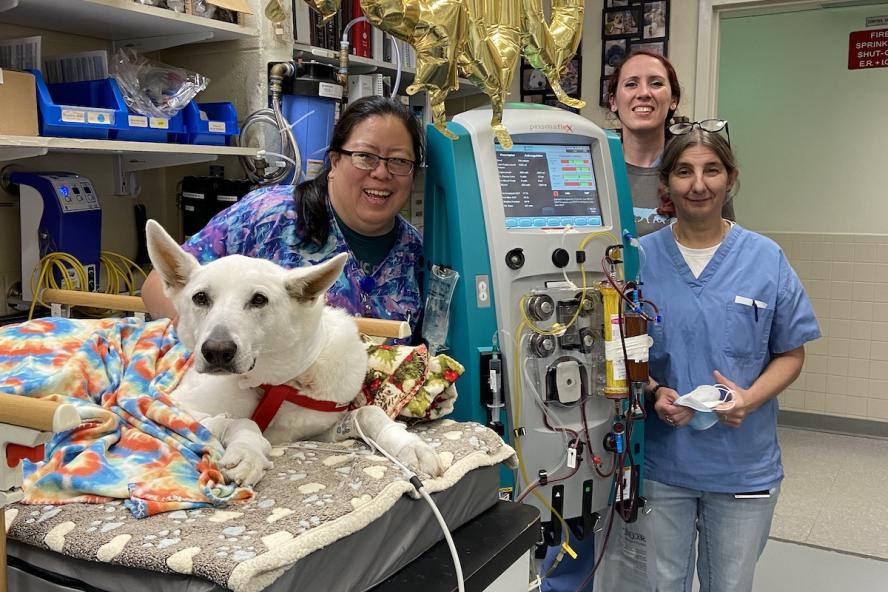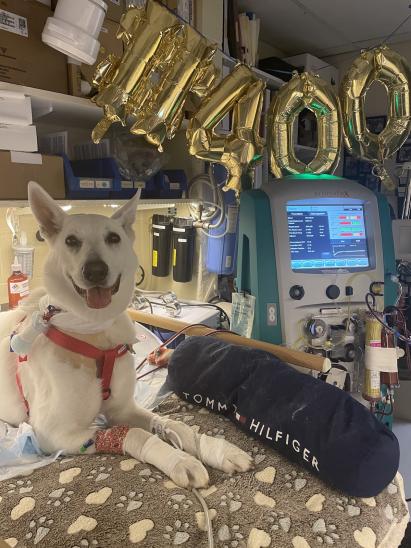-
About
- Leadership & Faculty
- News & Events
-
Academics
- Graduate
- Advanced Clinical Training
- Continuing Education
- Academic Departments
- Academic Offices
- Simulation Experiences
-
Student Life
-
Research
-
Hospitals & Clinics
- Emergency Care
- Hospital Services
-
Community Outreach
- Volunteer
400 and Counting
Foster Hospital for Small Animals saves German shepherd and reaches milestone number of extracorporeal therapy patients

When Serena, a six-year-old German shepherd suffering from immune-mediated hemolytic anemia (IMHA), was referred to Cummings School of Veterinary Medicine at Tufts University for therapeutic plasma exchange, she made the trek from Scarborough, Maine.
Cummings School’s Henry and Lois Foster Hospital for Small Animals is one of only two dozen locations in the United States with a veterinary dialysis center. In addition to dialysis, a treatment in response to kidney failure, Foster Hospital offers an extracorporeal therapy service, which administers treatments for immune-mediated diseases and toxicities, among others.
“With IMHA, the immune system destroys its own red blood cells,” explains Dr. Colleen Bourque, MVB (she/her/hers), a third-year Foster Hospital resident in small animal medicine. “After not eating, losing some weight, and being lethargic, Serena visited her vet who did blood work and found her red blood cell level was quite low, 17 percent.”
After a day of medications, Serena’s level dropped to 13 percent, so she had a blood transfusion and a full workup of tests at Maine Veterinary Medical Center. “She was very icteric and hyperbilirubinemic,” Bourque shares. “The bilirubin is a product of the red cell breakdown and it rose tremendously to 28, normal is 0.3. The criticalist there had trained at Tufts and quickly referred her to us for a therapeutic plasma exchange.”
A life-threatening situation
Serena’s life was in danger. “Dr. Oparil [of Maine Veterinary Medical Center] in Scarborough said that with this treatment she had a 50–70 percent chance of getting through this,” says Carrie Palmer, Serena’s owner. “That was the catalyst for me to give her that chance.”
When she arrived at Foster Hospital, Palmer was greeted at the door. “They were ready for us and within minutes we were registered, and Serena was attended to,” she says. “They explained what was happening to Serena’s body and how the treatment would be administered to help her recover. They started her on the first plasma exchange session that night.”
A second session was administered the following day. “I was consistently provided updates on Serena’s tests and her condition by Dr. Bourque, as well as a few photos, throughout her treatment,” says Palmer.
After the second session, Serena stabilized. “Thankfully, Serena’s red blood cell levels stabilized, and her bilirubin levels dropped,” says Bourque. “She only needed one blood transfusion during her six days with us and I sent her home with a bilirubin of 1.8.
Serena is recovering well, according to Palmer. “Her blood counts are almost back to normal, she is eating well, and her behavior is back to normal,” she says. “I would highly recommend Cummings School and want to make others aware of this type of care. They were tremendous.”
400th extracorporeal therapy patient
During her stay, Serena was celebrated as the 400th dialysis patient at Foster Hospital, since it began dialysis and extracorporeal therapy service in 2000. The demand for these services has increased 200 percent over the past seven years, according to Dr. Mary Labato, V83 (she/her/hers), a veterinary internist at Foster Hospital and Cummings School’s Anne Engen and Belle Professor in Clinical Nephrology.
Due to the complexities involved with treating animals who may have more than one ailment, all Cummings School internal medicine residents are required to learn dialysis as a part of their residency.
Bourque acknowledges that the opportunity to learn about dialysis treatments played a role in her pursuit of a residency at Cummings School. “Many places don’t have a dialysis center, so I thought this residency opportunity would provide a more well-rounded education to become an internal medicine specialist.”
Among its offerings, Foster Hospital uses therapeutic plasma exchange to address either immune-mediated thrombocytopenia or IMHA, as well as hemoperfusion, which filters the blood outside the body to remove a toxin. Without hemoperfusion, treatment for toxicities include inducing vomiting, administering activated charcoal orally, and intravenous fluids to maintain hydration. For some toxins, oral or intravenous antidotes often require multiple days of hospitalization and are often unable to remove all the toxin or its breakdown products, which may be more dangerous.
For small animals that require dialysis, Cummings School is the first veterinary school in the country to have a new machine called Carpediem™, which can provide dialysis treatments to animals (or humans) weighing 2–10 kg (4–22 lbs.), according to Labato.
“There are 14 in children’s hospitals, one in a private veterinary practice near Washington, D.C., and one here at Foster Hospital,” Labato explains. “The device enables treatment of very small animals, such as small cats, ferrets, or other exotic species.”
Cummings School’s Foster Hospital for Small Animals is located in Grafton, Massachusetts, and provides specialty care for dogs, cats, and exotic pets. Our veterinary specialty services are available by appointment only (508-839-5395) after a referral from a veterinarian. Emergency Services are available all day, every day. Please call 508-839-5395, option 3, prior to coming to the hospital.
Related links: Veterinary Technician Carolyn Tai coordinates Foster Hospital’s dialysis service
Department:
Foster Hospital for Small Animals
